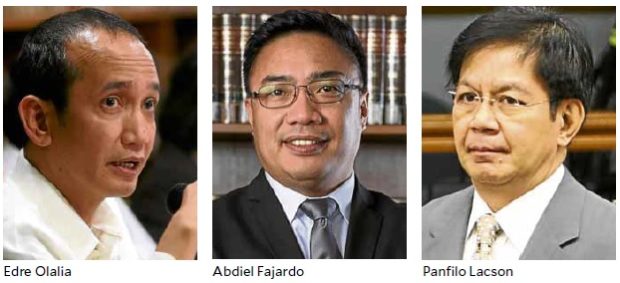PNP subpoena power given to only 3 officials, says Lacson

Human rights defenders and some lawmakers expressed concern over the possibility of abuse, but Sen. Panfilo Lacson, the author of the new law and a former PNP chief, said Congress gave subpoena power to only three PNP officials as safeguard against abuse.
“[I]f it’s indiscriminate, anyone could issue [a] subpoena, this will be difficult to control,” Lacson said.
Restored power
President Rodrigo Duterte last week signed Republic Act No. 10973, which amended the Local Government Code to give the PNP chief, the director of the PNP Criminal Investigation and Detection Group (CIDG) and his deputy subpoena power in relation to their investigative work.
Lacson said the new law simply restored the PNP’s subpoena power, which was removed by the Local Government Code.
Article continues after this advertisementUnder the new law, he said, the people under investigation cannot be forced to give a statement to police, especially if the statement would implicate them.
Article continues after this advertisementNeed for new safeguard
They can go to court for a temporary restraining order or an order for review or even appeal their cases to the Supreme Court, Lacson said.
The Integrated Bar of the Philippines (IBP) said on Sunday that it did not oppose the new law but emphasized the need for safeguards to avoid abuse when it was asked for comments by Malacañang.
Abdiel Fajardo, national president of the IBP, told the Inquirer that the IBP submitted its comment to the Office of the President three weeks ago.
Constitutional rights
“[The] IBP did not really oppose it [but gave a] reminder of [the] safeguards,” Fajardo said in a text message.
In its comment sent to Malacañang, the IBP said: “While nothing in the Constitution or any subordinate law bars the heads of the PNP and [the] CIDG from having the power to issue subpoena, the legal process cannot violate constitutional rights, the same restraint imposed on a subpoena from regular courts.”
This means, the IBP said, the subpoena powers given to the the PNP chief or the CIDG director or deputy director for administration “is subject to the same tests—test of relevancy and test of definiteness.”
“Also, the amendment limits the additional power to the issuance of the subpoena, nothing more. Neither the chief of the PNP nor the director or deputy director for administration of the CIDG can cite and punish persons in contempt for their refusal to appear or produce documents. Rather, a case for indirect contempt must be filed before the proper regional trial court,” the IBP said.
National Union of People’s Lawyers president Edre Olalia has joined the dissenters to the new law, which included former Sen. Rene Saguisag, a champion of human rights.
Olalia told the Inquirer that RA 10973 appeared to be harmless.
“It is subject to constitutional challenge … We have to go beyond the face of the document,” Olalia said.
He said he believed giving the PNP subpoena powers was the last thing the public needed amid President Duterte’s bloody campaign against illegal drugs.
Cannot refuse to appear
Olalia said the problem with the police having subpoena power was that the people summoned could not refuse “because of the coercive power of [the] police.”
“Everyone has the right to have a counsel and the right to remain silent. The police can circumvent that protection because they can say they are not arresting anyone, but there is a subpoena,” he said.
Quite simply, an ordinary citizen who will receive a subpoena signed by the PNP chief or the CIDG director can be expected to quake in fear, he said.
“You just poured all the state power on that person and you want him to appear at Camp Crame, which is right away a hostile environment to anyone summoned,” Olalia said.
Quasijudicial powers
The new law also gave the PNP quasijudicial powers, Olalia said.
“A subpoena gives one quasijudicial powers. This law enforcement agency becomes the judge, jury and executioner under this law,” he said.
Those who would ignore the PNP subpoena would risk being charged in court for indirect contempt and it would be “very easy” for the police to file charges of obstruction of justice against them, he added.
“The context is the worse: given that we have an unprofessional police force with a spotty record, it is given legal shortcuts. [The law] is an indirect way of doing something they cannot do directly,” Olalia said.